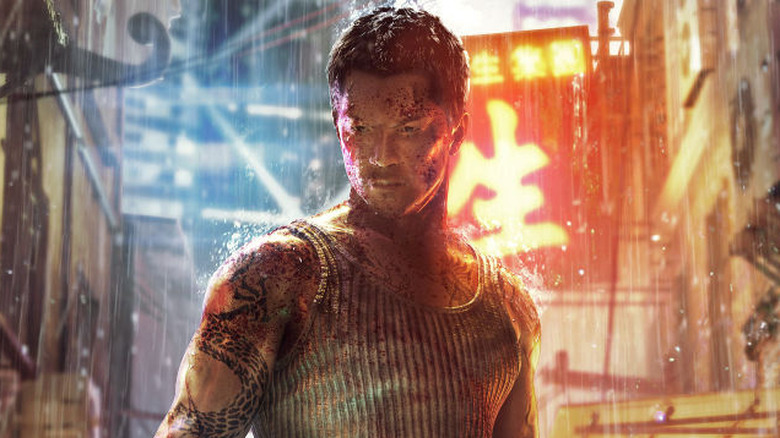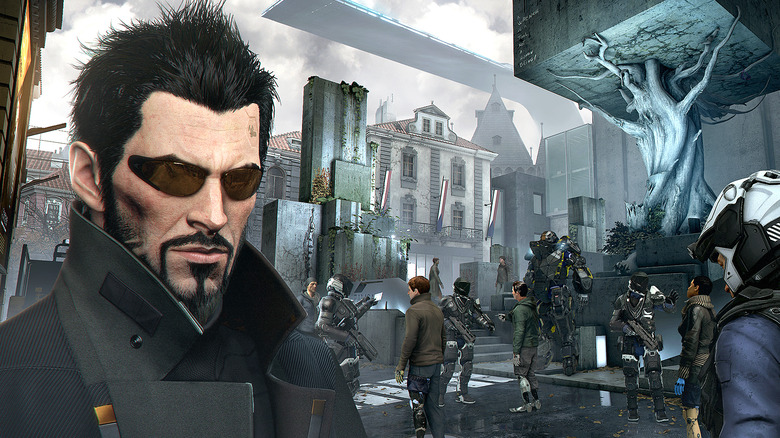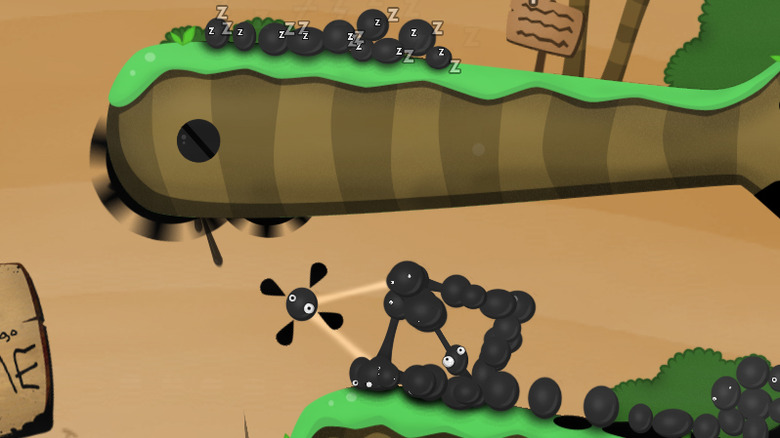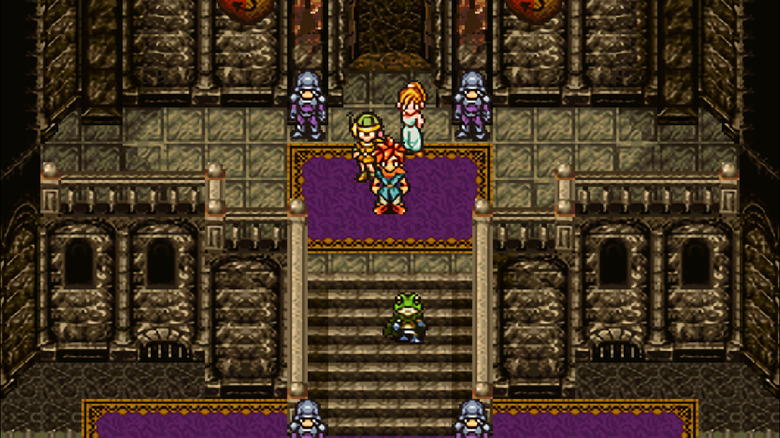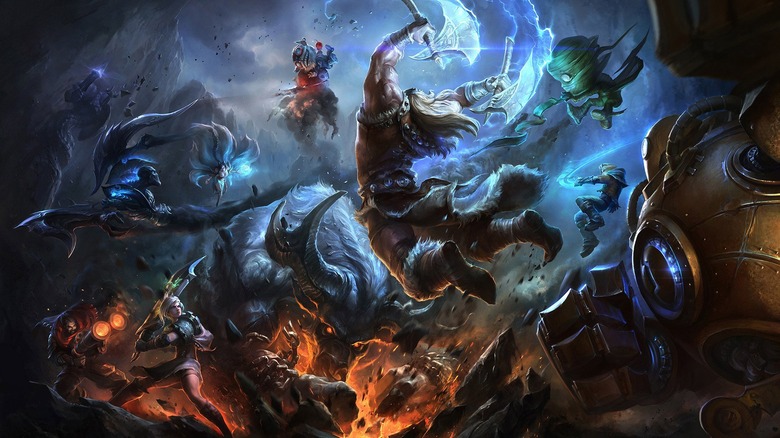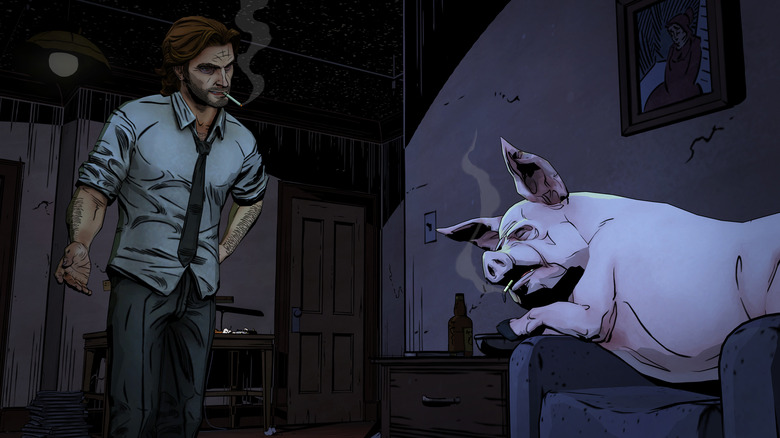Why We Never Got A Sequel To These Awesome Games
In a world where even the most reviled games — Bubsy, we're looking at you — get sequels, it's hard to imagine publishers letting a potential franchise lay dormant. Making a big, professional video game is expensive, after all. Why take a risk on a new property when you've got a sure thing just sitting there?
And yet, some excellent games don't get sequels. Some don't sell well enough to justify a follow-up, even if they're great. Some budding franchises fall victim to internal power struggles or changing corporate goals. Occasionally, real-life drama gets in the way. Often, it's simply a question of time. For fans of the following games, that's too bad — all of these titles certainly deserve sequels. Too bad they'll probably never get one.
Eternal Darkness: Sanity's Requiem
Eternal Darkness: Sanity's Requiem may not be the best-known GameCube game, but over time Silicon Knights' third-person adventure game has grown into a cult classic for a very good reason. As you unravel Eternal Darkness' Lovecraftian mystery, your 12 playable characters go a little crazy—and the game tries to make sure that you do, too. As your sanity meter depletes, camera angles abruptly change. Walls start bleeding. Characters begin to die for no reason. In extreme cases, Eternal Darkness even makes it look like your television is broken, or that your GameCube has malfunctioned.
It's a quirky and endlessly creative game, and fans have asked for a sequel for years. They won't get one. In 2007, Silicon Knights sued Epic Games, the company that makes the popular Unreal engine, claiming that Epic was sabotaging Silicon Knights' and other company's products and improperly using license fees. Epic counter-sued, claiming that Silicon Knights had stolen Epic's code. Epic won, and Silicon Knights filed for bankruptcy and disappeared.
A few years later, Silicon Knights president and Eternal Darkness director Denis Dyack tried to use Kickstarter to fund a spiritual sequel called Shadow of the Eternals. Not only did he fail to raise the money he needed, but the campaign was plagued by scandals; most notably, police arrested one key developer on child pornography charges. Nintendo still owns the Eternal Darkness trademark, so there's still a chance that a sequel will appear someday — but don't hold your breath.
Fez
In 2012, Phil Fish's Fez helped usher in the golden age of indie platforming games. Like Braid, Spelunky, and Super Meat Boy, Fez relies on the traditional jump-and-run mechanics popularized by Super Mario Bros., Sonic the Hedgehog. But it also ramps up the nostalgia with artful, simple, pixelated graphics, while introducing a brand new spin on tried and true mechanics. That meant turning the 2D world into a fully 3D playground. By rotating Fez's "flat" world by 90 degrees, players can discover new pathways, hidden secrets, and all kinds of collectible goodies.
It's simple, clever, and perfectly suited for a sequel. At one point, Fish agreed. Indie Game: The Movie depicts Fish as outspoken and angry, and portrays Fez's five-year development cycle as a grueling slog that cost Fish his friends, his sanity, and nearly his life. And yet, in 2013 Fish announced that work on Fez 2 had begin.
It fell apart a few months later. After GameTrailers' Marcus Beer criticized Fish on a video podcast, Beer and Fish embarked on a brief but heated Twitter feud. For Fish, who'd been feeling burned out following Fez's long development cycle—and who has some harsh words for the video game industry as a whole—it was apparently too much. Fish posted one last Twitter message—"im done. FEZ II is canceled. goodbye,"—locked his account, and promptly exited the game industry. At first, fans and press assumed that Fish, who had a history of histrionics, was joking. He wasn't. Fish's company, Polytron, confirmed the cancellation a short while later.
Jade Empire
Even if you're not a role-playing game aficionado, you probably know BioWare. In the late '90s and early '00s, the company brought Dungeons and Dragons to PC gamers everywhere with the ultra-successful Baldur's Gate series. Star Wars: Knights of the Old Republic is considered one of the best pieces of Star Wars fiction, game or otherwise, ever produced. BioWare's Dragon Age is a multi-million selling franchise. And despite some hiccups, Mass Effect remains gaming's preeminent space opera.
And then there's Jade Empire. While BioWare's kung fu RPG is just as good as any of those games, it's not nearly as well remembered. Maybe that's because there's only one of them. Like Knights of the Old Republic, Jade Empire features a branching storyline full of well-written characters, dynamic conversations, a good-versus-evil morality system, and plenty of choices to make. Its setting, a fantasy kingdom inspired by ancient China, is unlike anything gamers have seen before or since.
Most importantly, however, Jade Empire takes place in a big and detailed world. It's still fertile ground for storytellers. And yet, BioWare hasn't returned to the Two Rivers martial arts school since Jade Empire debuted in 2005. That's not for a lack of trying. Over the years, BioWare executives have said that they'd like to make more Jade Empire. In 2016 Game Informer revealed that a small team of BioWare designers even came together to work on a Jade Empire follow-up. Unfortunately, it didn't last. The designers even came up with a workable concept for the next Jade Empire game, but BioWare is a busy company, and the team was disbanded in order to focus on Mass Effect and Dragon Age — with decidedly mixed results.
Grim Fandango
If you missed out on LucasArts' glory days, good news: many of the company's beloved point-and-click adventure games, many of which were made by Double Fine head honcho Tim Schafer, have gotten modern remakes. If you want to play Day of the Tentacle, Full Throttle, or Grim Fandango, you can. With digital storefronts like Steam and GOG, enjoying these classic games has never been easier.
But, once you finish them, what do you do next? That's still a problem, especially for fans of the charmingly macabre Grim Fandango. It focuses on the journey departed souls take en route to their final resting place, and its quirky underworld seems like it's full of potential stories. Manuel "Manny" Calavera, a travel agent for the deceased, might get a definitive ending, but Grim Fandango is packed full of delightful and compelling characters. Any one of them would make a great lead for a potential sequel.
So, why haven't we gotten one? It's pretty simple: Schafer doesn't want to make it — at least, not as badly as he wants to create new things. "I would love to go back and spend time with the characters from any game I've worked on, and I would love to make a sequel to any of them," Schafer says, when asked about a Grim Fandango sequel. "But I also want to make something new. If there were five of me I might make sequels, but there's always some new idea I want to explore."
Minecraft
If you know anything about pop culture, you know about Minecraft. Since Markus "Notch" Persson released his blocky sandbox game in 2009, the game has sold over 120 million copies, making it the second-best selling video game of all time. In 2014, Microsoft bought Mojang, the company that makes and supports Minecraft, for $2.5 billion. These days, close to a decade after Minecraft's first release, 55 million people play the game every month.
In other words, while Minecraft is quite possibly the biggest name in the video game industry, there's just no need for a sequel. The original is still doing (and, more importantly, still selling) just fine, and a follow-up is entirely unnecessary. That still hasn't stopped rumors about Minecraft sequels from spreading, of course. In 2013, Mojang announced that Minecraft 2.0 was in beta testing, and that a handful of celebrity Minecraft players had already gotten their hands on the game. Mojang even had videos to prove it.
Of course, reading the Minecraft 2.0 patch notes — or the April 1st announce date — quickly unmasked the announcement as an elaborate April Fool's Day hoax. Don't worry: the original Minecraft isn't going anywhere.
Pokémon Snap
If you can think of a type of game, chances are, Pokémon's done it. Card games. Pinball games. Dungeon-crawling RPGs. Fighting games. Beat 'em ups. Match-three puzzlers. Racing games. Strategy titles. Typing trainers. Virtual pets.
And yet, among all of those games, Pokémon Snap stands out. Ostensibly, Pokémon Snap plays like an on-rails shooter — players travel through the game's levels automatically — but instead of unloading on wild Pokémon with bullets, they take pictures with a camera. You get more points for pictures that capture rare Pokémon, frame the subjects correctly, and contain rare or unusual poses or activities.
Nintendo's pocket monsters have never seemed more friendly or alive than they do in Pokémon Snap, and the game's photography mechanic has influenced later titles like Beyond Good & Evil, Dead Rising, and Pokémon Ultra Sun and Ultra Moon. But according to Pokémon brand manager Junichi Masuda, nobody's come up with a good spin for full-on sequel. "If they were to create another one, they'd probably need to come up with some kind of new invention to make it fresh," Masuda says. "Whoever made it would have to come up with something unexpected."
Still, who knows what the future holds? "Pokémon Snap was developed by HAL, originally, which is now part of Nintendo," Masuda observes. "I'm the director at the Pokémon Company, and we're certainly not stopping it from coming out!"
Sleeping Dogs
If you've ever wondered why we never got a sequel to True Crime: New York, it's because that game eventually jumped publishers and became Sleeping Dogs. If you've ever wondered why we never got a sequel to Sleeping Dogs, an open-world crime drama that took cues from Grand Theft Auto and Saint's Row, the answer is ... well, it's complicated.
Sleeping Dogs tells the story of an undercover police officer named Wei Shen as he infiltrates and cripples the Hong Kong criminal underground known as the Triad. It received positive reviews and sold close to two million copies, but was still considered a flop by its publisher, Square Enix. That didn't stop designers at Sleeping Dogs' developer, United Front Games, from proposing a sprawling and highly ambitious sequel. As reported on Waypoint, Sleeping Dogs 2 would've let players slap cuffs on any character that they encountered, use a mobile app to issue orders to Hong Kong's police force, and even change other people's single-player campaigns by fighting crime across the city.
Unfortunately, while United Front developed a few rough prototypes, Square Enix didn't bite and decided to throw its money behind more Hitman and Tomb Raider games instead. Still, the company liked some of United Front's ideas, and asked them to make a mobile Sleeping Dogs spin-off. Neither fans nor developers liked the idea, and the game, known as Triad Wars, was axed in 2016. United Front closed down shortly thereafter.
MVP Baseball
In 2004, Electronic Arts, the National Football League, and the NFL Player's Association made a deal. In exchange for lots and lots of money, Electronic Arts would be the only company allowed to make football video games featuring real-life NFL teams and players. The agreement worked out well for both parties, and Madden NFL has been the exclusive home of video game football ever since.
It did not work out well for 2K Sports, the company behind the well-regarded—and suddenly irrelevant—ESPN NFL series. In retaliation, 2K parent company Take-Two signed a similar exclusivity deal with Major League Baseball, abruptly ending Electronic Arts' MVP Baseball franchise. For sports gamers, that's a shame: the last entry in the franchise, MVP Baseball '05, is still considered one of the very best sports games ever made. It gets worse, too: after years of subpar releases, MLB 2K struck out too many times and got the axe, leaving gamers without an annual multi-platform baseball franchise. If you own a PlayStation console, there's MLB: The Show, but otherwise you're out of luck.
Even with the market wide open, EA executives say that all of the time off is going to make it very hard for the company to return to the pitcher's mound, forcing players to take matters into their own hands. MVP Baseball might be over a decade old, but every year, the fan community updates the game's rosters to reflect the current baseball climate. It's not a perfect solution, but until MVP Baseball gets an official sequel, it's the best one that we're going to get.
Star Wars: Republic Commando
Say what you will about the Star Wars prequels, but at least they resulted in a handful of good games—and Star Wars: Republic Commando is one of the best. As the leader of Delta Squad, Republic Commando players lead a group of Clone Troopers through the Clone Wars, issuing orders to teammates as they battle across war-torn planets like the Wookiee-homeworld Kashyyyk and Geonosis, the site of Attack of the Clones' climactic arena battle.
Before Republic Commando's release, LucasArts started work on not one but two potential sequels. One, pitched by Republic Commando level designer Kevin Schmitt, would've followed a former Delta Squad member as he became the Rebellion's first solider. Another, proposed by Republic Commando creative director Tim Longo, would've started after the Emperor issued Order 66, and would've tasked players with hunting down and killing the Jedi.
Neither happened. LucasArts went through a major restructuring right when Republic Commando launched, and a number of key personnel lost their jobs. Don't bother waiting for a revival, either. Shortly after Disney bought Lucasfilm in 2012, the Mouse House shuttered LucasArts and cancelled existing video game projects, including the highly anticipated crime thriller Star Wars 1313. The odds of any of those older Star Wars games getting a second lease on life are slim, especially given just how difficult it is to make a Star Wars game that meets Disney's standards—something that the folks at Visceral Games know all about.
Alan Wake
Many games deserve a sequel. Alan Wake demands one. Not only is the Stephen King-inspired action game set up like the first season of a long-running television show — the levels are even called episodes, and start with a "previously on" recap — but the game ended on a massive cliffhanger. That's all by design, Remedy Entertainment's creative director Sam Lake admits. "From the get-go, we assumed there was going to be a sequel," Lake says. "We mapped things further out when it came to character, story, details, and focus changes."
However, Mr. Wake's fate remains unknown (Alan Wake's American Nightmare, a downloadable follow-up to the full game, is more of a side-story than anything else). After finishing Alan Wake, Remedy started working on a sequel, and developed a prototype to woo possible publishers. Nobody bit. Eventually, Remedy ended up talking to Microsoft, which published the first Alan Wake. While Microsoft liked Remedy's ideas, the company decided that Alan Wake wasn't quite right for its current line-up, and Remedy started pitching Quantum Break instead.
Alan Wake fell by the wayside. It's unclear if the series will ever return. Alan Wake disappeared from digital storefronts in 2017 after its music licenses expired. Even if Wake's story continues, it's going to be very, very hard for newcomers to catch up. Still, hope springs eternal: an Alan Wake TV show is currently in development, and might just light the protagonist's way through the darkness.
It'll take an act of God to save Deus Ex
It's been a long, long road for Deus Ex, the series of open-ended cyberpunk roleplaying games that sprung from the mind of famed game designer Warren Spector. It started as a sci-fi take on Ultima: Underworld's dungeon-crawling and went on to spawn one of the single best games of all time and a bunch of sequels, comic books, novels, and so, so much more.
Now, however, Deus Ex's journey is on pause; if you enjoyed Deus Ex: Mankind Divided, hold on to those happy memories. Mankind Divided might've left behind a number of dangling plot threads, but the lack of resolution isn't enough to earn a game a sequel. Sales are, and apparently, Deus Ex: Mankind Divided just didn't have the numbers.
Besides, shortly after launch, the studio behind Deus Ex: Mankind Divided found itself busy making games like Shadow of the Tomb Raider and a rumored Guardians of the Galaxy tie-in. Those are both big projects, and they don't leave a lot of room for Deus Ex, no matter how much fans may want it. Square Enix promises that Deus Ex will return once Eidos has less on its plate, but in the meantime, the franchise is on an indefinite hiatus. "It would be ideal if we could work on all of them all of the time," Square Enix CEO Yosuke Matsuda says, "but... some titles have to wait their turn." Deus Ex is one of them.
Don't book a return trip to the World of Goo
Look, with so many titles on the market, it's hard for indie games to succeed. That's true now, and it was true ten years ago, when World of Goo made its debut. And yet, even in the year that kicked off the indie game boom, World of Goo held its own. Its central hook, which involves using small blobs to build towering, unstable structures was simply too interesting. Its whimsical graphics and oddball world, too charming. Its puzzles, too clever. Basically, World of Goo is just too good to ignore.
2D Boy, the company that made World of Goo, knows it, too, just like they're aware that it's pretty unlikely that lightning is going to strike the same place twice. When asked about a sequel, World of Goo co-developer Ron Carmel is pretty adamant that it's a no-go. "The only sequel to meet the expectations created by the original is The Empire Strikes Back," Carmel says, "and even then, it was just because George Lucas didn't direct it."
Kyle Gabler, the other member of World of Goo's two-man development team, doesn't think a sequel is necessary anyway. Fans are already keeping slimy new content coming. Just a few months after World of Goo launched, players started making a level editor, which left beta a little less than a year later. These days, there are hundreds and hundreds of new levels to enjoy. Really, it's the best of all worlds.
Square Enix won't pull the trigger on Chrono
As Chrono Trigger proves, a blockbuster game does not a sequel guarantee. From the moment that it was released, Chrono Trigger has been one of the best 16-bit Japanese roleplaying games of all time. However, while lesser Japanese RPG series run into the double digits, the entire Chrono franchise is only three games large. There's the SNES original, a text-based side-story called Radical Dreamers that wraps up a couple of sideplots, and Chrono Cross, a PlayStation RPG that's basically Radical Dreamers all over again.
That's not much of a legacy, especially for a game that teamed Final Fantasy creator Hironobu Sakaguchi with Dragon Quest mastermind Yuji Horii. As always, it looks like studio politics got in the way. At a PAX Prime panel, Sakaguchi admitted that he wanted Chrono Trigger to be an ongoing series, but clashed with Square's higher-ups on the direction that the franchise would take.
Maybe that's for the best. Horii says that Dragon Quest is flexible enough to accommodate anything he wants to do, making a return to the Chrono-verse unlikely. Meanwhile, director Takashi Tokita took ideas from a long-canceled game called Chrono Break (not officially confirmed to be a Chrono Trigger sequel, but with a name like that, c'mon) and put them into Final Fantasy Dimensions II, a mobile title. If you want to see what the future of Chrono Trigger could've looked like, download that.
It's like Riot says: Legends never die
Fortnite might be king of the headlines, but when it comes to actual numbers, League of Legends still reigns supreme. It has over 100 million monthly players (Fortnite only has 78 million). 628,000 concurrent viewers watched Drake and Ninja play some Fortnite: Battle Royale together, which isn't bad — heck, it's a record for a single Twitch channel — but you know how many people watched the 2016 League of Legends World Championships at once? According to Riot Games, 14.7 million.
That's a lot of League, and Riot has a good excuse not to make a sequel: Riot simply loves the original game too much. See, like Fortnite, League of Legends is constantly changing. A new hero here. A revamp of an existing champion there. The occasional new mode. Periodic graphics updates to keep things looking fresh and modern. Riot rolls out League of Legends patches about once every two weeks, and they've got no plans to stop any time soon.
Look at it this way: every few years, League of Legends ends up being its own sequel. There's no need for an official one. Riot has decades of League content planned — "I want my great-grandchildren playing this game," one Riot staffer says — and when the company does something else, they're going to go all out. League of Legends 2 is off the table, but a brand new IP? Count on it.
The Wolf Among Us' second season is little more than a fairy tale
You might want to sit down, because we've got some bad news. Telltale Games, the studio behind some of the most popular narrative-driven games of the past decade, is gone. Thanks to a combination of poor management and the departure of two potential investors, the company ran out of money and shut down on September 21, 2018, leaving behind nothing but a skeleton crew to wrap up its Netflix-induced obligations.
That means no more The Walking Dead, no more Tales from the Borderlands, no more Batman, and no more Game of Thrones. Most heartbreaking, though, that also means no more The Wolf Among Us. While The Walking Dead received four seasons and a short Michonne-centric spin-off, we only got one helping of Telltale's adaptation of Bill Willingham's Fables. That's devastating. The first time around, the fairy tale-themed murder mystery ended up being one of Telltale's best games, and we wanted more.
We almost got it, too: The Wolf Among Us Season 2 was announced in 2017 and was supposed to arrive in 2018. Before too long, however, it was delayed until 2019. When the studio closed, The Wolf Among Us ended up canceled entirely. It looks good ol' Bigby Wolf has drawn his final breath. Boo!

